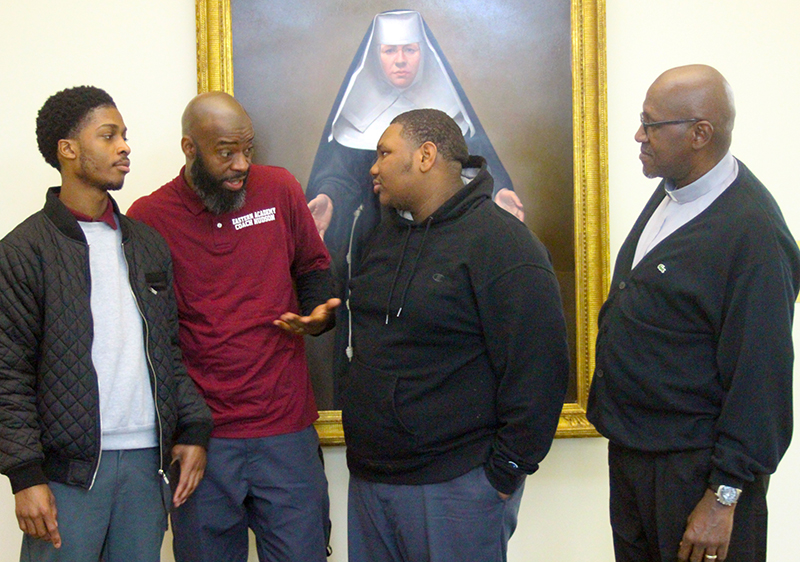
Ubaidullah Mohammad (left) and Durand Ward (center), recent graduates of the St. Katharine Drexel School in Bensalem, speak with principal Terrance Hudson (second from left) and spiritual minister Deacon Anthony Willoughby. The school is part of the St. Francis-St. Joseph and St. Vincent Homes, through which archdiocesan Catholic Social Services provides educational and behavioral support to more than 100 dependent and delinquent teens. (Photo by Gina Christian)
Fresh out of high school, friends Durand Ward and Ubaidullah Mohammad are taking different career paths — Ward is aiming for a business degree, and Mohammad (a fan of Italian food) is interested in culinary arts.
And while Ward is a math geek and history buff, Mohammad prefers reading a good novel.
But both agree that St. Katharine Drexel School, from which they’ve just graduated, gave them something that will last a lifetime.
“A second chance,” Ward said.
[hotblock]
The school, part of the Bensalem-based St. Francis-St. Joseph and St. Vincent Homes, has just honored 13 students who received their high school diplomas from an array of area schools while in residence at the homes.
Operated by archdiocesan Catholic Social Services, the homes offer residential and educational programs, as well as case management and outpatient clinical services, for more than 100 dependent and delinquent teens.
(Related: Bright futures, history of service shine at school graduation)
For principal Terrance Hudson, who directs the home’s state-accredited St. Katharine Drexel School, every graduation ceremony at the school “brings chills.”
“Seeing each kid step out of our program, and knowing the challenges that they’ve come with, overwhelms me,” said Hudson, now in his 15th year at the school. “I look at them and think, ‘You’ve fought through the mud, and you have a better understanding of what it means to be a young man or a young woman. Now take this experience and move on to the next.’”
Earning a diploma is an even more remarkable feat for the students, given the hurdles they have faced, Hudson said.
“Some of our kids haven’t gone to school for periods of time, up to six months or a year in some cases,” he said. “They’ve had to take care of their siblings because mom or dad were on drugs, or street life was more important.”
Yet through the patient support of the school’s staff, students can quickly catch up with their peers, said Hudson.
“In two months, they taught me so much stuff I didn’t know,” Ward said. “I learned how to contain myself from doing things I didn’t need to, and I learned how to stay on the right track.”
[tower]
Noting that he’d been “struggling with credits” prior to his arrival, Mohammad said he was able to graduate on time thanks to “extra classes” and the dedicated tutoring of teachers, who routinely volunteered to stay well past the end of the school day.
Programs that develop financial literacy, enhance college prospects and strengthen job skills round out the curriculum, preparing students for life after graduation.
But the most profound lessons the St. Katharine Drexel youth learn aren’t found in textbooks or workshops.
“The students who come here do so with trauma in their lives,” said Hudson, adding that staff spend hours “building rapport” with teens who have lived for years on high alert due to violence and poverty.
“When I first came here, I was like, ‘I’m Muhammad Ali, step out of my way,’” said Mohammad, who along with Ward gradually realized that he could let down his guard with staff and fellow students.
In particular, many students struggle to learn patience, and to see the value of structure and hard work in reaping long-term benefits.
“A lot of our kids have this ‘microwave syndrome,’ where they think everything is done easily and quickly,” said Hudson. “Our grandparents and our mothers cooked it from scratch, and that’s what I’m trying to teach them.”
The school’s suburban location, with its extensive lawns and clusters of trees, calms and revives teens who have largely known gritty, inner-city neighborhoods.
“You sit on the front porch, you smell the fresh air and you just take it all in,” said Ward. “That’s the thing I most enjoy, the silence. When you’re just sitting outside, breathing and enjoying the little things.”
In addition, seeing African-American men such as Hudson and spiritual director Deacon Anthony Willoughby in leadership roles has a profound effect on students, many of whom are also African-American.
“It gives them another perspective, one they haven’t necessarily had in their previous schools,” said Hudson. “I present myself as a model to them and to my staff, and I work to remind them that we are here for a purpose.”
[hotblock2]
Hudson added that part of that purpose is to give the students a shot at something they’ve never really been able to do: to finally be a kid for a little while, before it’s too late.
“For so many of them, it wasn’t stable at home, and some of them haven’t been a kid,” he said. “So we let them know we have adults here who will look out for them, and whether you’re down our you’re happy, we’ll cheer you on.”
Hudson can always tell when that lesson gets through to his students.
“Once you have a kid’s smile, and he enters your life and wants to talk with you, shake your hand,” he said.
Learning to trust and to bond with others has been transformative, said Ward.
“These guys here are my siblings,” he said. “So if one of us goes through something, we all go through it. And if one of us falls down, we just help the other one get back up. We take responsibility.”
PREVIOUS: Allentown Diocese cuts 24% of staff to fund victims’ compensation
NEXT: Bright futures, history of service shine at school graduation


Share this story